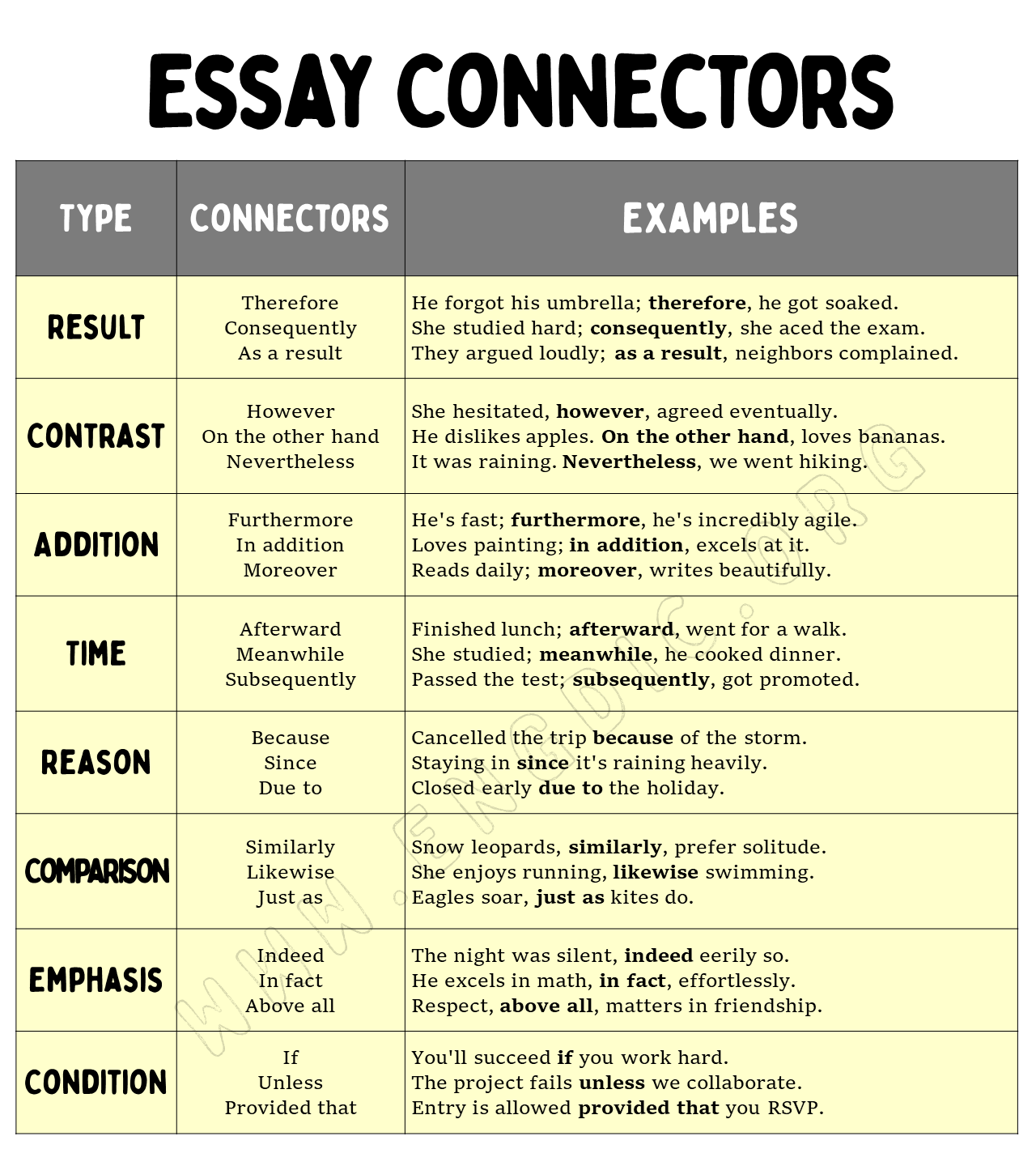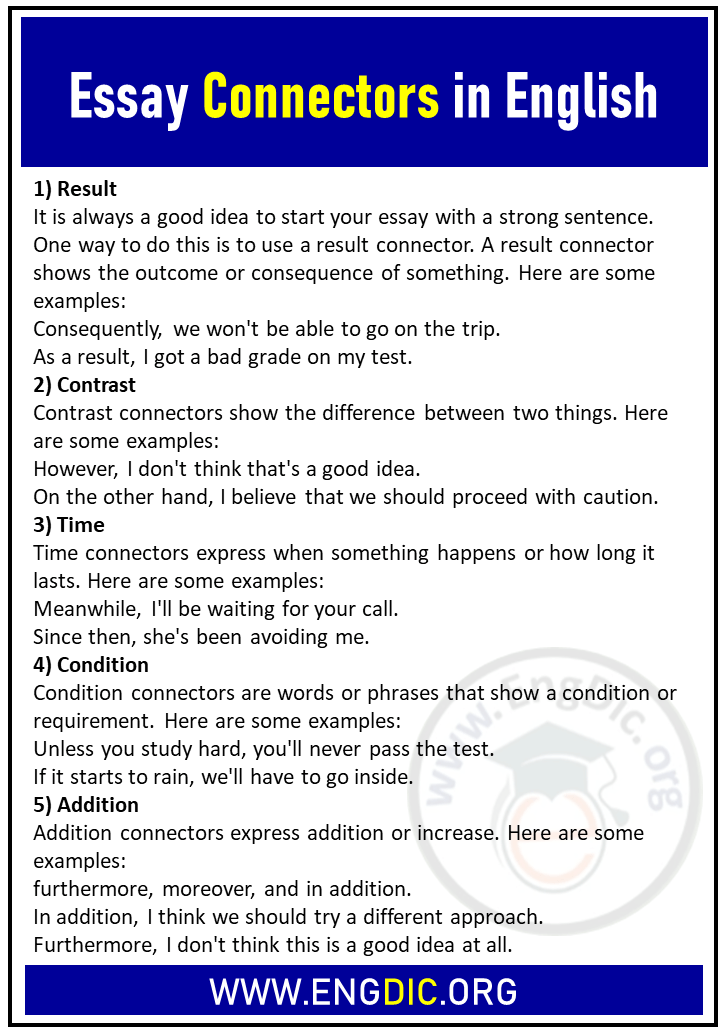In this useful lesson, we’re going to explore some magic keys that help link your ideas together in English: essay connectors! Think of these connectors as bridges that help your thoughts flow smoothly from one to the next, making your stories and explanations easier to follow.
Whether you’re just starting your English learning journey or looking to polish your skills, these connectors will be your best friends in writing and speaking more clearly. So, get ready to add some sparkle to your English with these handy tools!
What are Connectors in an Essay?
Connectors are words or phrases that join two or more sentences together. They can be used to create smooth, logical sentences. In this blog post, we’ll take a look at some of the most common connectors in English and give you some examples of how to use them.
They are also called linking words or linking phrases.
Why use Connectors in an Essay?
Connector words and phrases help to create a smooth, logical flow of ideas in your essay. They make your writing easier to read and understand.
List of Essay Connectors in Detail
1) Result
It is always a good idea to start your essay with a strong sentence. One way to do this is to use a result connector. A result connector shows the outcome or consequence of something. Here are some examples:
- Consequently, we won’t be able to go on the trip.
- As a result, I got a bad grade on my test.
2) Contrast
Contrast connectors show the difference between two things. Here are some examples:
- However, I don’t think that’s a good idea.
- On the other hand, I believe that we should proceed with caution.
3) Time
Time connectors express when something happens or how long it lasts. Here are some examples:
- Meanwhile, I’ll be waiting for your call.
- Since then, she’s been avoiding me.
4) Condition
Condition connectors are words or phrases that show a condition or requirement. Here are some examples:
Unless you study hard, you’ll never pass the test.
If it starts to rain, we’ll have to go inside.
5) Addition
Addition connectors express addition or increase. Here are some examples:
furthermore, moreover, and in addition.
- In addition, I think we should try a different approach.
- Furthermore, I don’t think this is a good idea at all.
6) Cause and Effect
Cause and effect connectors express the relationship between two things. They show how one thing caused another thing to happen. Here are some examples:
- The sound of the thunder caused her to scream.
- He didn’t study for the test, so he failed.
7) Location
Location connectors express where something takes place. Here are some examples:
- The meeting will be held in the conference room.
- She always sleeps in her bed.
8) Purpose
Purpose connectors express the reason why something is done. They show the purpose of an action or event. Here are some examples:
- I’m studying English to improve my language skills.
- He was late for class because he lost his bus ticket.
9) Comparison
Comparison connectors compare two things. They show how they are similar or different. Here are some examples:
- He’s the best basketball player I’ve ever seen.
- She runs faster than any other girl on the track team.
10) Conditionals
Conditional connectors express a hypothetical situation. They show what would happen if something were to happen. Here are some examples:
- If I had more money, I would buy a new car.
- If you studied harder, you would likely get better grades.
As you can see, there are many different types of essay connectors in English. These connectors help you create clear and logical sentences. By using them correctly, you can make your writing sound more professional and academic.


How do you use Connectors in an Essay?
Using connectors in essays requires a few steps:
- Choose the connector that best suits your needs.
- Connect the two sentences with the connector.
- Make sure the sentences are logically connected.
Here’s an example:
Result: I didn’t get a good grade on my test.
Contrast: However, I got a good score on the practice test.
The result of not studying was that I got a bad grade on my test. However, the contrast is that I did well on the practice test.
Make sure your sentences are properly connected with a connector to create a logical argument. By using connectors, you can make your writing clear and concise.
Now that you know all about essay connectors, try using them in your own writing. Practice makes perfect, so keep practicing until using connectors becomes second nature to you. Soon, you’ll be writing essays that are clear, concise, and well-organized.
Comparison
- Equally
- As with
- Likewise
- In the same way
- Similarly
- Like
- Of contrast
- Despite this
- In comparison
- In contrast
- Even though
Cause & Effect
- Because
- Since
- For
- So
- Consequently
- Therefore
- Thus
- Hence
- Owing to
- As a result of
- Causes
- As a consequence of
- Leads to
- Contributes of
- Brings about
- Results in
- Because of this
- For this reason
- Stems from
- Comes from
- Results from
- Is the result of
- Is the consequence of
- Is due to
- Is caused by
Contrast
- However
- Nevertheless
- Alternatively
- Despite this
- On the contrary
- Yet
- Whereas
- Apart from
- Even so
- Although
- In spite of
- While
Addition
- And
- Also
- In addition
- Further
- Furthermore
- Besides
- In addition to
- Moreover
- Additionally
- Not only … but also
- Then
- Again
- Finally
illustration
- For example
- Such as
- For instance
- Such as
- In other words
- An instance
- As revealed by
- To show that
- In the case of
- As an example
- For one thing
Opinion
- I think
- I believe
- I feel
- In my opinion
- In my view
- As far as I know
- It seems likely
- It seems to me
- In my experience
- I believe that
- As for me, I think
- If I am not mistaken
- What I mean is
- I’d say that
- Personally, I think
Conclusion
- To conclude
- In conclusion
- Finally
- On the whole
- Summarizing
- Overall
- To sum up
- Evidently
Persuasion
- Of course
- Clearly
- Evidently
- Surely
- Indeed
- Undoubtedly
- Decidedly
- Certainly
- For this reason
- Besides
- Again
